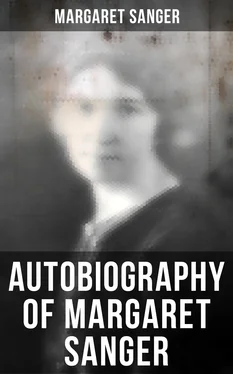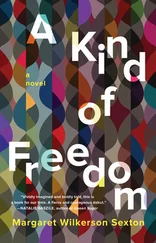I had many things to do which could not be postponed, the most important among them being to provide for the children’s future. This occupied much of my time for the next few weeks. Temporarily, I sent the younger two to the Catskills and Stuart to a camp in Maine, arranging for school in the fall on Long Island.
Defense funds were always being raised when radicals got into trouble to pay pseudo-radical lawyers to fight the cases on technicalities. I was not going to have any lawyer get me out of this. Since my indictment had not stopped my publishing the Woman Rebel, through the columns of the September issue I told my subscribers I did not want pennies or dollars, but appealed to them to combine forces and protest on their own behalf against government invasion of their rights. That issue and the October one were both suppressed.
During what might be called my sleepwalking stage it was as though I were heading towards a precipice and nothing could awaken me. I had no ear for the objections of family or the criticism of friends. People were around me, I knew, but I could not see them clearly; I was deaf to their warnings and blind to their signs.
When I review the situation through the eyes of those who gave me circumspect advice, I can understand their attitude. I was considered a conservative, even a bourgeoise by the radicals. I was digging into an illegal subject, was not a trained writer or speaker or experienced in the arts of the propagandist, had no money with which to start a rousing campaign, and possessed neither social position nor influence.
In the opinion of nearly all my acquaintances I would have to spend at least a year in jail, and they began to condole with me. None offered to do anything about it, just suggested how I could get through. One kind woman whom I had never seen before called late one evening and volunteered to give me dancing lessons. In a small six-by-four cabin she had developed a system which she claimed was equally applicable to a prison cell and would keep me in good health. She even wrote out careful directions for combining proper exercises with the rhythm of the dance.
But I myself had no intention of going to jail; it was not in my program.
One other thing I had to do before my trial. Family Limitation simply must be published. I had at last found the right person—Bill Shatoff, Russian-born, big and burly, at that time a linotype operator on a foreign paper. So that nobody would see him he did the job after hours when his shop was supposed to be closed.
At first I had thought only of an edition of ten thousand. However, when I learned that union leaders in the silk, woolen, and copper industries were eager to have many more copies to distribute, I enlarged my plan. I would have liked to print a million but, owing to lack of funds, could not manage more than a hundred thousand.
Addressing the envelopes took a lot of work. Night after night the faithful band labored in a storage room, wrapping, weighing, stamping. Bundles went to the mills in the East, to the mines of the West—to Chicago, San Francisco, and Pittsburgh, to Butte, Lawrence, and Paterson. All who had requested copies were to receive them simultaneously; I did not want any to be circulated until I was ready, and refused to have one in my own house. I was a tyrant about this, as firm as a general about leaving no rough edges.
In October my case came up. I had had no notice and, without a lawyer to keep me posted, did not even know it had been called until the District Attorney’s office telephoned. Since Mr. Content had promised me plenty of time, I thought this was merely a formality and all I had to do was put in an appearance.
The next morning I presented myself at court. As I sat in the crowded room I felt crushed and oppressed by an intuitive sense of the tremendous, impersonal power of my opponents. Popular interest was now focused on Europe; my little defiance was no longer important. When I was brought out of my reverie by the voice of the clerk trumpeting forth in the harshly mechanical tones of a train announcer something about The People v. Margaret Sanger, there flashed into my mind a huge map of the United States, coming to life as a massive, vari-colored animal, against which I, so insignificant and small, must in some way defend myself. It was a terrific feeling.
But courage did not entirely desert me. Elsie Clapp, whose ample Grecian figure made her seem a tower of strength, marched up the aisle with me as though she, too, were to be tried. I said to Judge Hazel that I was not prepared, and asked for a month’s adjournment. Mr. Content astonished me by objecting. “Mrs. Sanger’s had plenty of time and I see no reason, Your Honor, why we should have a further postponement. Every day’s delay means that her violations are increased. I ask that the case continue this afternoon.”
A change in Judge Hazel’s attitude had taken place since August. Instead of listening to my request, he advised me to get an attorney at once—my trial would go on after the noon recess.
I was so amazed that I could only believe his refusal was due to my lack of technical knowledge, and supposed that at this point I really had to have a lawyer. I knew Simon H. Pollock, who had represented labor during the Paterson strike, and I went to see him. He agreed with me that a lawyer’s plea would not be rejected and that afternoon confidently asked for a month’s stay. It was denied. He reduced it to two weeks. Again it was denied. At ten the following morning the case was to be tried without fail.
From the Post Office Department I received roundabout word that my conviction had already been decided upon. When I told this to Mr. Pollock he said, “There isn’t a thing I can do. You’d better plead guilty and let us get you out as fast as we can. We might even be able to make some deal with the D.A. so you’d only have to pay a fine.”
I indignantly refused to plead guilty under any circumstances. What was the sense of bringing about my indictment in order to test the law, and then admit that I had done wrong? I was trying to prove the law was wrong, not I. Giving Mr. Pollock no directions how to act, I merely said I would call him up.
It was now four o’clock and I sought refuge at home to think through my mental turmoil and distress. But home was crowded with too many associations and emotions pulling me this way and that. When my thoughts would not come clear and straight I packed a suitcase, went back downtown, and took a room in a hotel, the most impersonal place in the world.
There was no doubt in my mind that if I faced the hostile court the next morning, unprepared as I was, I would be convicted of publishing an obscene paper. Such a verdict would be an injustice. If I were to convince a court of the rightness of my cause, I must have my facts well marshaled, and that could not be done in eighteen hours.
Then there was the question of the children’s welfare. Had I the right to leave them the heritage of a mother who had been imprisoned for some offensive literature of which no one knew the details?
What was I to do? Should I get another lawyer, one with personal influence who could secure a postponement, and should we then go into court together and fight it out? I had no money for such a luxury. Should I follow the inevitable suggestion of the “I-told-you-so’s” and take my medicine? Yes, but what medicine? I would not swallow a dosage for the wrong disease.
I was not afraid of the penitentiary; I was not afraid of anything except being misunderstood. Nevertheless, in the circumstances, my going there could help nobody. I had seen so many people do foolish things valiantly, such as wave a red flag, shout inflammatory words, lead a parade, just for the excitement of doing what the crowd expected of them. Then they went to jail for six months, a year perhaps, and what happened? Something had been killed in them; they were never heard of again. I had seen braver and hardier souls than I vanquished in spirit and body by prison terms, and I was not going to be lost and broken for an issue which was not the real one, such as the entirely unimportant Woman Rebel articles. Had I been able to print Family Limitation earlier, and to swing the indictment around that, going to jail might have had some significance.
Читать дальше












